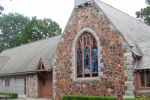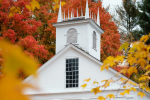May 2023
LGBTQ+ Pride
Becoming the Person God Created Me to Be
“I will bless you, and you will be a blessing.” – Genesis 12:2
I’m standing in front of the altar, parishioners holding their hands over me in blessing. A former Presbyterian pastor and current postulant to the priesthood is intoning a blessing in Hebrew to honor my fifth anniversary of physical transition, and I am loving my church and my journey.
My heart thinks back to the fifth anniversary of my social transition at the diocesan convention where I was elected to the Standing Committee. Five years and one month before, I had come to self-realization as a transgender woman. And, feeling that I must be my authentic self to do the spiritual work of convention, I had thrown myself at the work of transitioning in order to appear at convention as the woman that I knew myself to be.
Blessing or burden?
At convention, everyone I spoke with held me and supported me, from my bishop and regional canon to the many people I had worked with in the diocese. A beloved friend and priest told me how wonderful it was that I was becoming the person God had created me to be. That summed up how I felt too. But a couple of weeks later when I came out to my parish, I began feeling more like a burden than a blessing. I would sit in the church parking lot screwing up the courage to walk through the red door. I felt that I was an embarrassment and that I should just go away and make things easier for everybody.
Ash Wednesday fell on Valentine's Day that year, and I was blessed to resume my ministry of lay preaching. I used the text from Amos where God asks us to rend our hearts and not our garments. I spoke of how coming out was like holding my broken and somehow still breaking heart in my hands, and how Lent should be a time where we come out to God in all our brokenness but also where we give God the space to come out to each of us.
Moments of grace
I remember the joy and wonderment I felt that Easter. Wearing a beautiful new dress for the very first time, I knew that I was participating in a resurrection myself.
But resurrection is not a one-time event, rather an ongoing challenge to us to experience every day in ever new ways. My parish and I had to adjust to a new reality that was both a continuation and a break from our previous life together. It was a time to give and receive grace.
Patterns that had been etched into our way of being needed to change. I had a new name and new pronouns. Adjusting to the new reality was an ongoing process for all of us. Among other things, we had to work through and beyond moments of misgendering and the use of my birth name.
It still felt as if I were a burden when people struggled to acknowledge my “newness.” And it was challenging to deal with members of the parish who were perhaps careless, especially when that carelessness trended toward callousness and occasionally even cruelty.
I had to learn and relearn the grace of forgiveness, and I had to give myself the grace to be strong and courageous in claiming safe space for myself.
Those moments of grace took place within the larger context of the diocese as well. There were – and are – moments of pain, but ever so many more of joy and love.
Much work remains
I appreciate how wonderful and precious my diocese is in its growing affirmation of my gifts and the gifts of my trans siblings. Which makes it that much more painful to realize that I would not have had the same experience in every diocese and parish of the church.
It causes me great sorrow to be unable unreservedly to recommend the Episcopal Church to my trans siblings throughout America. So much work remains to be done before the entire church can be safe space for trans people that allows us to be nurtured and transformed. But the creation of safe harbor for trans people creates space for the entire church to be nurtured and transformed.
What I have learned
If my lived experience in the Episcopal Church teaches me anything, it is that my trans siblings and I are not a burden but entirely a blessing: We give voice to God’s deepest longing for the church to seek out the lost sheep and stand fearlessly alongside the least of these, to empty itself of prestige and power and to give voice to the voiceless.
And when the church empties itself, it opens itself to incarnation – an incarnation that embraces the messiness and confusion of our genderedness and our sexuality. And so it was that when I boldly and graciously asked for the blessing of my five-year milestone, I knew that I was blessing my parish as much as they were blessing me.
Freya Gilbert has called four different countries home. She recently retired from a career in hotel management. She's been active as a lay leader in the Diocese of Northern Indiana and the dioceses of East and Western Michigan. At any given point she's reading at least 20 books and she loves spending quiet evenings with her two cats, who are named after the main characters in Finnegans Wake.
Resources:
- A Service of Renaming from the Book of Occasional Services 2018, page 120
- Discipleship from the Margins, an ECF Vital Practices webinar presented by Dr. Sandra Montes, David Patiño and Atticus Zavaletta, June 12, 2019






